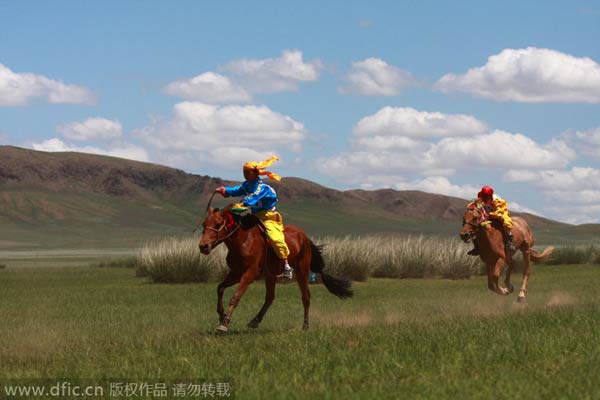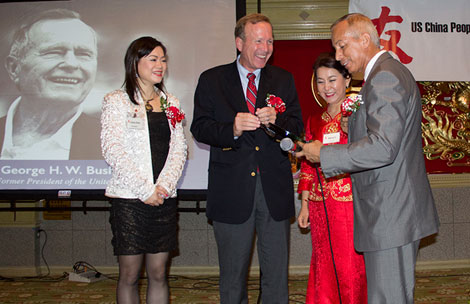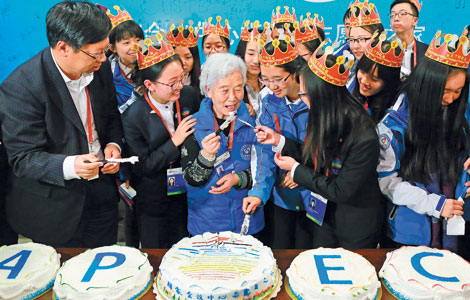Nomads feeling cool in using social networking
Updated: 2014-11-08 17:42
(Xinhua)
|
||||||||
 |
|
Chinese herdsmen ride horse on the grassland in North China's Inner Mongolia autonomous region, July 30, 2011.[Photo/IC] |
HOHHOT - In bustling Chinese cities, urbanites use social media for chat and work; in the vast grasslands of North China's Inner Mongolia, nomads depend on it to sell cows and search for lost horses.
It is badly needed, as spreading information is very difficult in loosely populated areas where herdsmen would live dozens of kilometers apart.
Na Sutu, a Mongolian herder of Ujimqin Grassland in Xilin Gol League, regularly posts cattle information on Moments, an information-sharing function embedded in the popular instant messaging service WeChat, which he says brings much better businesses.
"In the past, I had to contact retailers to sell cows, but now business comes to me," the 32-year-old man said.
With the permeation of social media tools like microblog Weibo and WeChat, the lives in Mongolian yurts spread across the grassland have been revolutionized.
Gone are the days when Alamusi Qiqige used to spend days riding motorcycles or horses to find missing cows and horses on the extensive Abaga Banner grassland.
Now he can simply use his phone to contact fellow nomads, who are more than willing to offer a helping hand and forward messages on lost cattle.
"These mobile applications have become so useful for us," said Qiqige, who recently used WeChat to recover lost livestock.
The use of the technology even goes to rent houses, recruit workers and invite people for weekend parties.
Unlike regular phones with Chinese and English keyboards, Mongolian input functions are not yet popularized. Instead, local herdsmen take pictures of a piece of paper with the information written in Mongolian and upload the photos to instant messaging services.
Eyeing the emerging market, some companies have offered to publish messages for local people free of charge in public platforms on WeChat.
Local governments in Mongolian-concentrated areas have also jumped on the bandwagon by establishing platforms on the mobile service, as they publicize consultation services and government moves in dialect to keep the ethnic minorities in touch with policies.
"I am just glad to get connected in the mobile era, because it makes our lives easier and closer," said Siqin Bater, resident of Zhabilahu Village, Xianghuang Banner.
 |
 |
| Student turns WeChat into fruit market | Social media inform more consumers |

 Chengdu holds Ebola patient drill at airport
Chengdu holds Ebola patient drill at airport
 Gala celebrates USCPFA's 40th anniversary in Houston
Gala celebrates USCPFA's 40th anniversary in Houston
 Official: badminton world No. 1 fails dope test
Official: badminton world No. 1 fails dope test
 Apple hits back at malware in China
Apple hits back at malware in China
 BROTHERS IN ARMS
BROTHERS IN ARMS
 Happy Birthday
Happy Birthday
 Canadian PM meets Alibaba's Jack Ma for SME growth
Canadian PM meets Alibaba's Jack Ma for SME growth
 3D printing wows at Wuhan Optics expo
3D printing wows at Wuhan Optics expo
Most Viewed
Editor's Picks

|

|

|

|

|

|
Today's Top News
APEC sketches out roadmap for FTAAP
China to face trade challenges in 2015: MOC
China, Canada ink currency swap deal
China, Tajikistan pledge economic cooperation
APEC ministers adopt FTAAP Beijing Roadmap
New York City home to only 2m rats
Xi backs Tajikistan's link plan
Bund loses luster as luxury retailers leave
US Weekly

|

|







